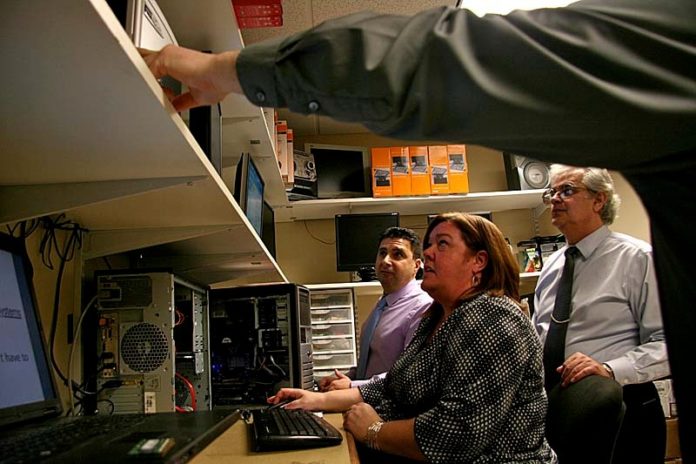
Companies are finally opening their wallets to upgrade information technology and local service firms, including NetCenergy, East Coast Technology Group, Bentley Information Technology Systems and RCC have all gotten a boost.
Last year saw a 6.9 percent increase in spending on information technology worldwide, according to information technology research firm Gartner. The forecast for 2012 projects continued, though smaller, gains of 3.7 percent.
Beneficiaries pointed to a host of reasons that may have contributed to the increased spending, including the cyclical nature of IT upgrades, federal tax changes that encouraged IT spending before the end of 2011 and even decisions by smaller companies to lay off their in-house IT person and hire freelance providers.
“We often see a flurry at year-end. There is a pent-up demand,” said Michael A. Rudnick, president of RCC in Providence. “Companies are waiting as long as they can – they are waiting longer than they used to for replacement of equipment. Depending on the type of company, they’re making purchases now because the market is more solid – not necessarily more positive. But some companies unfortunately are still holding off, much to their detriment,” said Rudnick.
“The reason I say much to their detriment … is our philosophy – as well as industry recommendations – is that you replace equipment within three to five years. We have seen companies benefit financially by adopting that and suffer when they haven’t,” Rudnick explained.
Rudnick said one of his clients held onto computers for six or seven years, and when it finally upgraded, RCC saw its monthly billable hours for that company decline by five hours.
“If they have older computers, we’d have more work but we always – 100 percent of the time – want them to get the newer computer. Quite frankly, it’s not work we like. [They] end up spending $200 to $300 on a four-year-old computer … we don’t feel good about it,” he said, estimating that his company’s income saw a 20 to 30 percent increase last year.
Cumberland-based East Coast Technology Group has seen a net increase in revenue, but looking at the individual factors tells a different story. Hardware sales have gone down by about 20 percent while services have gone up about 35 percent, said Steven J. Gietz, president.
“In a lot of cases, it’s costing them more money to wait and not spend the money now,” he added.
For Issy Ramos, director of IT for Warwick’s Bentley Information Technology Systems, it’s not so much new business, but rather existing clientele are now asking for quotations to replace hardware and upgrade existing software – “which is something that we did not see much of [in 2010],” he said.
“Right now we’ve got quotations for new equipment [and] replacement equipment in manufacturing, health care … across the board,” he said. “We are getting increased activity in regards to better antivirus protection and [a product we resell] for easy central [IT] management.”
“Malware [and] identity theft have just gotten so extreme from even two years ago,” he said.
Another reason why IT companies had better years could be related to two tax deductions for purchasing old and new equipment in 2011.
“I would not be surprised if some [chief financial officers] are telling their tech guys: ‘If you’re going to buy something in the next six months – do it now,’ ” said Donald R. Nokes, president of NetCenergy.
Supporting that theory was Debra Mitchell, principal at accounting and advising firm Braver PC in Providence.
Mitchell said the two federal deductions – Section 179 and the bonus depreciation – were big incentives for companies to make their IT purchases.
Section 179, she explained, allowed businesses to take full depreciation on new and used assets – including certain software – in one year, rather than slowly over several years – for up to $500,000. That deduction is being slashed to $125,000 in 2012.
Bonus depreciation let businesses take up to a 100 percent deduction on new assets, which is going down to 50 percent in 2012, Mitchell said.
Additionally, Nokes noted that he has seen an uptick in business since many companies decided to terminate their in-house IT person during the economic downturn.
“The good news was, we were getting more IT-service business. The bad news was these people [are getting laid off] and going to us instead. That’s what I think contributed to us being kind of a recession-proof business,” he said.
Ramos said that he prefers for companies to have their own in-house IT person. “Since we collectively speak ‘geek’ with one another, we can have sessions over the phone and guide their IT personnel and show them the areas to look at – it saves the client money because we don’t have to go out and make a service call – they get the job done faster and in a more efficient way.”
Companies that have eliminated in-house IT staff “put a little more pressure on us to better know our clients and provide them with the services they may not know they need,” Nokes said. NetCenergy, based in Warwick, saw its hardware sales swell 29 percent in 2011 compared with a year earlier.
“December typically sees a spike as businesses spend any remaining [money] at the end of the year,” he said, noting this past December was a particularly fruitful month – nearly double December 2010 hardware sales.
NetCenergy’s largest area of service growth, like many local firms, was in its cloud-services area – more than 200 percent.
“Now the conversation [with clients] is – it’s time to do something about your server, do you want to buy a new one or outsource? There are pros and cons of each aspect of it,” Nokes said.
“It’s a lot easier to say [to a cloud-services provider] ‘give me this much less CPU or RAM’ – but you can’t go into your back room and get some money back for portions of the server you’re not using,” he added.
Whatever the reason for the recent demand, Nokes doesn’t see the growth as an indicator the economy’s back on its feet.
“I think it’s just a matter of cycles,” he said. •











